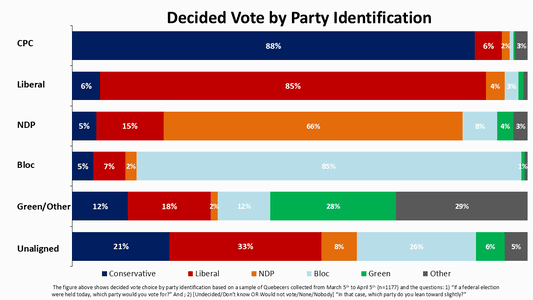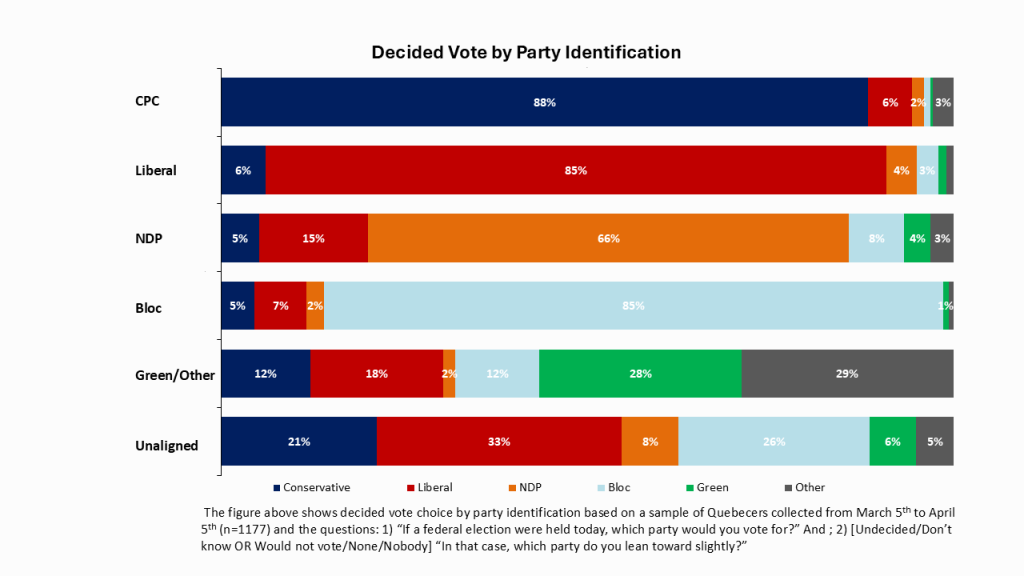
However, there are some signs that the tariff momentum is ebbing for the Liberals.
INNOVATIVE has combined the Quebec results of five waves of our online election tracking surveys, sponsored and conducted by Innovative Research Group Inc. (INNOVATIVE). The goal is to develop a better understanding of how Quebec voters have been shifting. The findings are based on online interviews of 1,435 Canadian citizens living in Quebec between March 5th, 2025 and April 5th, 2025. Results are weighted by age, gender, region, education, and self-reported federal past vote to ensure that the overall sample’s composition reflects that of the actual population according to Census data. We will update this analysis next week with results from surveys conducted in the last week and over this weekend.
Mark Carney and the Liberal Party are pulling well ahead in Quebec, with a commanding 14-point lead over the Bloc Québécois among decided voters. Sitting at 40% among this group, the Liberals are also the top choice for Quebecers without a firm party affiliation, who represent 20% of the electorate. Meanwhile, the Conservatives lag far behind at just 19%, weighed down by Pierre Poilievre’s notably negative net favourability of -20% in the province.

Carney’s image as a strong, knowledgeable leader is gaining traction. 37% of Quebecers now see him as the best choice for Prime Minister—more than double Poilievre’s 18%. Much of this support is driven by Carney’s stance on U.S. trade matters and his perceived strength on handling Donald Trump, which are resonating positively with voters.
However, not all is smooth sailing for Carney. Scrutiny over his assets and potential conflicts of interest is starting to register negatively with the public, becoming one of the more frequently mentioned topics when we ask Quebecers what they have read, seen or heard about him.
The Bloc Québécois is losing its footing. Despite holding a lead in the 450 region, the party is trailing or tied with the Liberals elsewhere in the province. Currently at 26% of the decided vote, the Bloc is struggling to maintain relevance. Blanchet’s messaging on the U.S. trade war appears to be backfiring, producing a negative impact with voters—especially in contrast to Carney’s more favorably received approach. Alarmingly, just 1 in 5 Quebecers report having recently read, seen or heard anything about Yves-François Blanchet or the Bloc, and 7% of self-identified Bloc supporters say they’re leaning Liberal. The party also fails to hold an edge in second-choice support, sitting neck and neck with the NDP.
Carney’s advantage on U.S. relations is clear for now, but the payoffs may be time-limited. Approval of the federal government’s handling of U.S. relations remains in positive territory at +31%, and even Bloc partisans mostly approve. But that approval is sliding—dropping 16 points over the past month. Concern about tariffs remains high at 76%, though it too has declined by 10 points in recent weeks. As voter concern over U.S. issues wanes, so too might the political returns from Carney’s edge on this file.
Click here to read the full report!




































